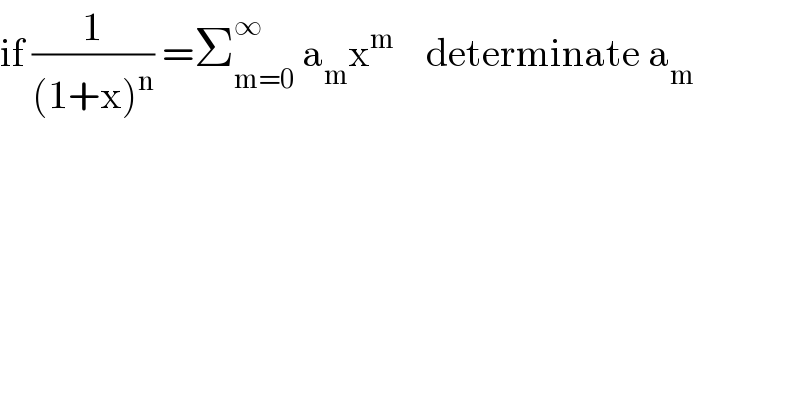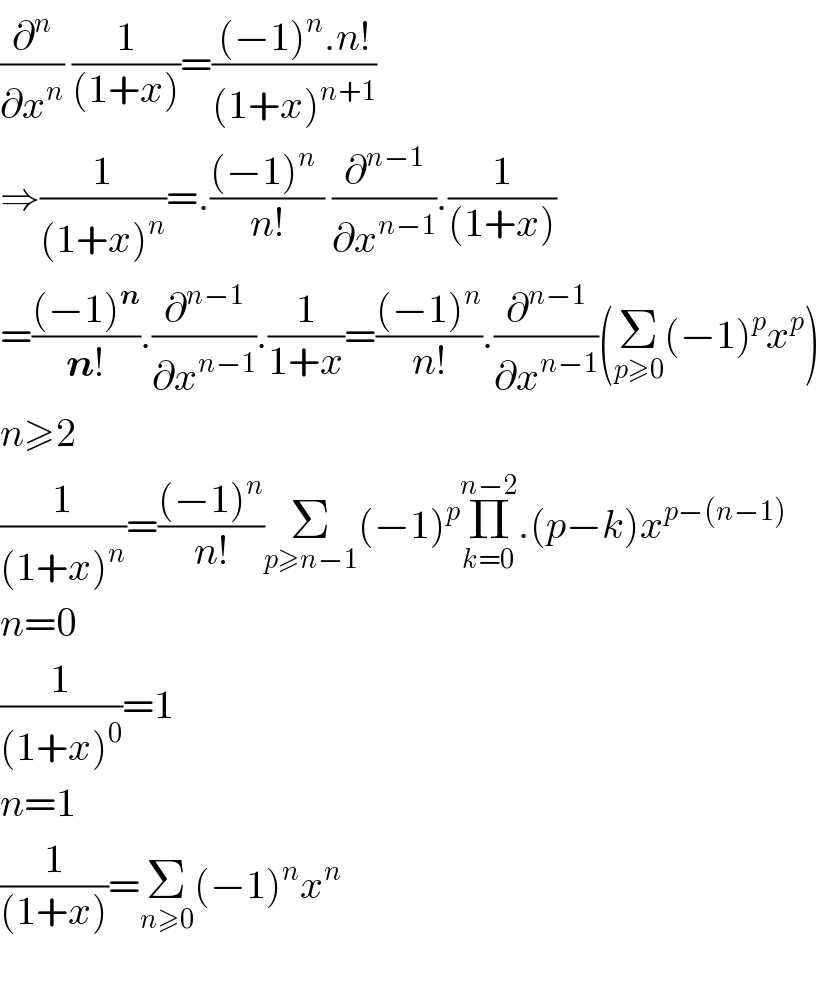Question Number 98940 by mathmax by abdo last updated on 17/Jun/20

$$\mathrm{if}\:\frac{\mathrm{1}}{\left(\mathrm{1}+\mathrm{x}\right)^{\mathrm{n}} }\:=\sum_{\mathrm{m}=\mathrm{0}} ^{\infty} \:\mathrm{a}_{\mathrm{m}} \mathrm{x}^{\mathrm{m}} \:\:\:\:\mathrm{determinate}\:\mathrm{a}_{\mathrm{m}} \\ $$
Commented by mr W last updated on 17/Jun/20

$${for}\:{n}\geqslant\mathrm{2}: \\ $$$$\frac{\mathrm{1}}{\left(\mathrm{1}+{x}\right)^{{n}} }=\underset{{m}=\mathrm{0}} {\overset{\infty} {\sum}}\left(−\mathrm{1}\right)^{{m}} {C}_{{n}−\mathrm{1}} ^{{m}+{n}−\mathrm{1}} {x}^{{m}} \\ $$
Answered by maths mind last updated on 17/Jun/20

$$\frac{\partial^{{n}} }{\partial{x}^{{n}} }\:\frac{\mathrm{1}}{\left(\mathrm{1}+{x}\right)}=\frac{\left(−\mathrm{1}\right)^{{n}} .{n}!}{\left(\mathrm{1}+{x}\right)^{{n}+\mathrm{1}} } \\ $$$$\Rightarrow\frac{\mathrm{1}}{\left(\mathrm{1}+{x}\right)^{{n}} }=.\frac{\left(−\mathrm{1}\right)^{{n}} \:}{{n}!}\:\frac{\partial^{{n}−\mathrm{1}} }{\partial{x}^{{n}−\mathrm{1}} }.\frac{\mathrm{1}}{\left(\mathrm{1}+{x}\right)} \\ $$$$=\frac{\left(−\mathrm{1}\right)^{\boldsymbol{{n}}} }{\boldsymbol{{n}}!}.\frac{\partial^{{n}−\mathrm{1}} }{\partial{x}^{{n}−\mathrm{1}} }.\frac{\mathrm{1}}{\mathrm{1}+{x}}=\frac{\left(−\mathrm{1}\right)^{{n}} }{{n}!}.\frac{\partial^{{n}−\mathrm{1}} }{\partial{x}^{{n}−\mathrm{1}} }\left(\underset{{p}\geqslant\mathrm{0}} {\sum}\left(−\mathrm{1}\right)^{{p}} {x}^{{p}} \right) \\ $$$${n}\geqslant\mathrm{2} \\ $$$$\frac{\mathrm{1}}{\left(\mathrm{1}+{x}\right)^{{n}} }=\frac{\left(−\mathrm{1}\right)^{{n}} }{{n}!}\underset{{p}\geqslant{n}−\mathrm{1}} {\sum}\left(−\mathrm{1}\right)^{{p}} \underset{{k}=\mathrm{0}} {\overset{{n}−\mathrm{2}} {\prod}}.\left({p}−{k}\right){x}^{{p}−\left({n}−\mathrm{1}\right)} \\ $$$${n}=\mathrm{0} \\ $$$$\frac{\mathrm{1}}{\left(\mathrm{1}+{x}\right)^{\mathrm{0}} }=\mathrm{1} \\ $$$${n}=\mathrm{1} \\ $$$$\frac{\mathrm{1}}{\left(\mathrm{1}+{x}\right)}=\underset{{n}\geqslant\mathrm{0}} {\sum}\left(−\mathrm{1}\right)^{{n}} {x}^{{n}} \\ $$$$ \\ $$
Commented by mathmax by abdo last updated on 18/Jun/20

$$\mathrm{thank}\:\mathrm{you}\:\mathrm{sir}\:. \\ $$
Answered by mathmax by abdo last updated on 18/Jun/20

$$\mathrm{f}\left(\mathrm{x}\right)\:=\frac{\mathrm{1}}{\left(\mathrm{1}+\mathrm{x}\right)^{\mathrm{n}} }\:\Rightarrow\mathrm{f}\left(\mathrm{x}\right)\:=\sum_{\mathrm{m}=\mathrm{0}} ^{\infty} \:\frac{\mathrm{f}^{\left(\mathrm{m}\right)} \left(\mathrm{0}\right)}{\mathrm{m}!}\:\mathrm{x}^{\mathrm{m}} \:\mathrm{let}\:\mathrm{determine}\:\mathrm{f}^{\left(\mathrm{m}\right)} \left(\mathrm{0}\right) \\ $$$$\mathrm{f}\left(\mathrm{x}\right)\:=\left(\mathrm{x}+\mathrm{1}\right)^{−\mathrm{n}} \:\:=\left(\mathrm{x}+\mathrm{1}\right)^{\mathrm{p}} \:\:\:\mathrm{with}\:\mathrm{p}\:=−\mathrm{n}\:\Rightarrow\mathrm{f}^{\left(\mathrm{m}\right)} \left(\mathrm{x}\right)\:=\left\{\left(\mathrm{x}+\mathrm{1}\right)^{\mathrm{p}} \right\}^{\left(\mathrm{m}\right)} \\ $$$$\mathrm{if}\:\mathrm{m}>\mathrm{p}\:\mathrm{f}^{\left(\mathrm{m}\right)} \left(\mathrm{x}\right)=\mathrm{0}\:\:\mathrm{if}\:\mathrm{m}\leqslant\mathrm{p}\:\:\:\:\mathrm{we}\:\mathrm{have}\:\mathrm{f}^{\left(\mathrm{1}\right)} \left(\mathrm{x}\right)\:=\mathrm{p}\left(\mathrm{x}+\mathrm{1}\right)^{\mathrm{p}−\mathrm{1}} \\ $$$$\mathrm{f}^{\left(\mathrm{2}\right)} \left(\mathrm{x}\right)\:=\mathrm{p}\left(\mathrm{p}−\mathrm{1}\right)\left(\mathrm{x}+\mathrm{1}\right)^{\mathrm{p}−\mathrm{2}} \:\Rightarrow\mathrm{f}^{\left(\mathrm{m}\right)} \left(\mathrm{x}\right)\:=\mathrm{p}\left(\mathrm{p}−\mathrm{1}\right)…\left(\mathrm{p}−\mathrm{m}+\mathrm{1}\right)\left(\mathrm{x}+\mathrm{1}\right)^{\mathrm{p}−\mathrm{m}} \\ $$$$=\left(−\mathrm{n}\right)\left(−\mathrm{n}−\mathrm{1}\right)….\left(−\mathrm{n}−\mathrm{m}+\mathrm{1}\right)\left(\mathrm{x}+\mathrm{1}\right)^{−\mathrm{n}−\mathrm{m}} \\ $$$$=\:\left(−\mathrm{1}\right)^{\mathrm{m}} \:\mathrm{n}\left(\mathrm{n}+\mathrm{1}\right)….\left(\mathrm{n}+\mathrm{m}−\mathrm{1}\right)\left(\mathrm{x}+\mathrm{1}\right)^{−\mathrm{n}−\mathrm{m}} \:\Rightarrow \\ $$$$\mathrm{f}\left(\mathrm{x}\right)\:=\sum_{\mathrm{m}=\mathrm{0}} ^{\mathrm{n}} \:\frac{\mathrm{f}^{\left(\mathrm{m}\right)} \left(\mathrm{0}\right)}{\mathrm{m}!}\:\mathrm{x}^{\mathrm{m}} \:=\sum_{\mathrm{m}=\mathrm{0}} ^{\mathrm{n}} \:\frac{\left(−\mathrm{1}\right)^{\mathrm{m}} \mathrm{n}\left(\mathrm{n}+\mathrm{1}\right)…\left(\mathrm{n}+\mathrm{m}−\mathrm{1}\right)}{\mathrm{m}!}\:\mathrm{x}^{\mathrm{m}} \:\Rightarrow \\ $$$$\mathrm{a}_{\mathrm{m}} =\frac{\left(−\mathrm{1}\right)^{\mathrm{m}} \:\mathrm{n}\left(\mathrm{n}+\mathrm{1}\right)….\left(\mathrm{n}+\mathrm{m}−\mathrm{1}\right)}{\mathrm{m}!} \\ $$
